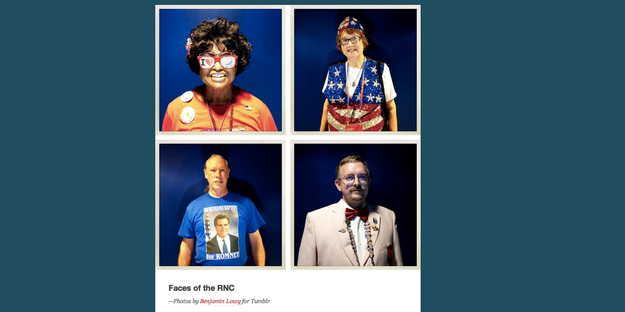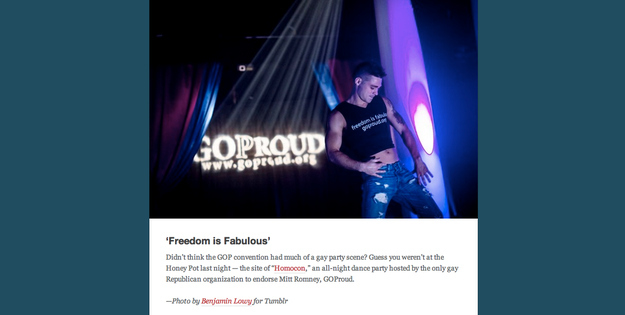Of the estimated thousands of journalists at the Republican National Convention, these people stand out. For one, they're not political reporters in the traditional sense of the term. And, though this is less of a novelty than it may seem, they're posting exclusively to Tumblr. They're also posting for Tumblr, as part of one the site's early forays into original journalism.
Accompanying editors Chris Mohney, Jessica Bennett and Liba Rubenstein are six Tumblr users — "Correspondents," at least for the week — who are on the floor in Tampa, conducting interviews, scanning for news, and gauging the mood like their peers on the press corp. (You can find their blogs and bios at the site.) The posts they publish show up on a special page, election.tumblr.com, where they sit alongside the best community posts from Tumblr users in Tampa and around the world. (Of course, this being Tumblr, the majority of users will find these posts through their dashboards.)
The end product is disarmingly native — images and quotes aggregated from outside of Tumblr mingle easily with short updates and photos from the floor and longer posts that would feel right at home on a news site's campaign blog. It relishes the absurd and the meta, and neither bets on the horse race nor concerns itself with terms like "the horse race." It's liberal not in message but in sensibility and tone; it's a site for youngish Tumblr users, by youngish Tumblr users.

Chris Mohney, the journalist Tumblr hired earlier this year to build a sort of meta-blog newsroom, explains what the site is doing: "For our purposes this isn't a media exercise; this is a community exercise within the framework of journalism and Tumblr-style content." But that seems like a slight undersell; the election site feels different than Tumblr's previous steps into content production. Tumblr has highlighted popular posts for a long time now, and the addition of moderated subject pages (with "Evangelists") has given it something like sections. ReBlorg, a sort of all-Tumblr best-of landing page, launched a few weeks ago, and Storyboard is home to multiple weekly Tumblr-centric features and videos, conceived and reported in-house. The latest post is about Kitty Pryde.
What makes this operationally different is that the reporters are on the ground, and the coverage is about a specific event. Tumblr, in a small but not insignificant way, is now behaving like a news organization.
"First, our goal is not to play in the arena of traditional political coverage," says editor Liba Rubenstein. "We're not trying to do the same thing that a news organization would do, so it means our perspective is inherently different."

Blogger Bobby Finger was one of the users Tumblr approached for a correspondent job. "Yeah, it was certainly surprising," he says, "[O]nce we'd been selected, we were essentially asked to blog as ourselves. Blog as we normally would — in our own personal voices." (Tumblr says they scouted for people "who are politically engaged but don't necessarily only blog about politics.") Jayel Aheram, a photographer, says the mission given to him by Tumblr has been freeing: "To me, it's not like we're reporting on what everyone else is reporting. We're reporting on the novel things that are out there, things that may not be considered newsworthy by mainstream news organizations — but certainly interesting for our audience: Tumblr users."
Mohney and Rubenstein emphasized that Tumblr is structured in such a way that all the coverage is outward-facing as well as inward ("No content on Tumblr is closed; it's absolutely fluid"), and that while the election site is targeted at the Tumblr community, it's already getting recognition from the outside world — I was pointed to an interview with Libertarian candidate Gary Johnson conducted by correspondent Meg Lanker-Simons, which was picked up by terrestrial radio.

But the main conversation about these stories, photographs, links and GIFs is, of course, unfolding on Tumblr. It's a surprisingly friendly one, too — a novelty in political coverage, where even the most pandered-to comment sections brim with bile. And speaking of pandering, you don't really see that here, at least not in a partisan sense. Is posting lots GIFs considered pandering on Tumblr? Does it even matter?) The writers' politics are sometimes evident, but you won't see any screeds.
Tumblr's election experiment is a modest one — they'll be at the DNC next week, too — and it would be a mistake to read too far into it. But it's a new data point in a visible trend, and one more step away from mere community curation toward planned, editorially guided creation. It's also totally distinct from what Facebook and Twitter have been doing with the election — both companies are harnessing user data largely for the press, and releasing tools that, while potentially interesting to users, are descriptive and poll-like, and have no editorial aspect. It's a sign that Tumblr sees itself as a different type of company that Twitter or Facebook — less data-obsessed, for one. What Tumblr is doing could represent a somewhat dizzying reorientation of how media gets made — it's an audience growing a newsroom, not the other way around. Nobody is quite sure what the relationship between giant social sites and the media should look like, but Tumblr, at least, isn't taking for granted that the two have to remain separate.
Asked if a more traditional Tumblr newsroom was in the cards, Rubenstein explained: "We're going to keep experimenting with programs like this. We have community verticals for everything from art to food, so the possibilities are endless."
As for whether or not the company is considering, perhaps, more permanent beat reporters for non-Tumblr topics, rather than just moderators and curators, Mohney was coy. "Maybe."
Perhaps the real answer is a question itself: Why not?
